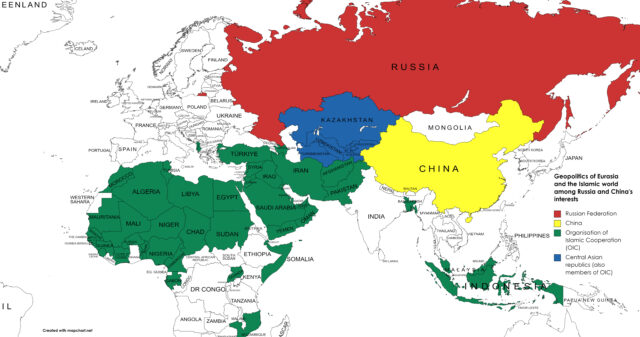The importance of KazanForum 2023 and the China-Central Asia Summit for Eurasia and the Islamic world’s geopolitics

During this week, Russia will attempt to increase its political and business partnership with the Arab-Muslim world while China will promote its cooperation with Central Asian states. The KazanForum 2023 and the “China-Central Asia” Summit definitely emphasise Kremlin and Beijing’s strategies in Eurasia and the Islamic world’s strategic areas in time of confrontation with the West.
- KazanForum 2023 accentuates the Russian plan to increase collaboration with the Islamic world to fight Western sanctions and keep away from any form of isolationism.
- The “China-Central Asia” Summit confirms Beijing’s involvement in the region and the Chinese strategy of playing a significant role in a strategic area crossed by the Belt and Road Initiative.
- The two events corroborate the importance of the Eurasian geopolitical chessboard in Moscow and Beijing’s foreign policies and both Russia and China’s attempts to increase their presence and counter Western influence on regional dynamics.
Information Background
On May 18th-19th, 2023, the city of Kazan in the Republic of Tatarstan will host the XIV International Economic Forum “Rossija – Islamskij mir: Kazan Forum” (Russia and the Islamic World). The event underlines the importance that the Islamic world has in Moscow’s foreign and economic strategy.
According to the Russian organisers, the purpose of the forum is to strengthen trade, economic, scientific, technical, social and cultural ties between Russia and the countries of the Organisation of Islamic Cooperation.
During the same days, the Chinese city of Xi’an will host the “China-Central Asia” Summit. Central Asian heads of state will meet the Chinese President Xi Jinping to discuss a new package of investments.
The city of Xi’an, one of the oldest cities in the world, the former capital of China, from where the Great Silk Road began, is the epicentre of Beijing’s cooperation with the Central Asian republics.
Scenario Analysis
Islamic countries are Kremlin’s strategic target. Moscow has orchestrated a foreign policy to improve the connection between the Russian market and the Islamic world.
Being able to leverage a significant Muslim minority (about 12-15% of the Russian population is Muslim), the Kremlin might strengthen ties with the countries of the Arab-Muslim world and counter not only the effect of Western economic sanctions but also the presence of European and US companies in the Middle East and Africa.
On February 1st, 2023, the Russian government launched a pilot project to implement Islamic banking in Chechnya, Dagestan, Tatarstan, and Bashkortostan to attract the interest of Muslim countries and investors, especially the Gulf Arab monarchies. The Islamic banking will be one of the core topics which KazanForum 2023’s participants will hugely discuss, confirming how crucial is for the Kremlin establishing business and financial relations with the Islamic world.
Recently, on May 4th, 2023, in Mineralnye Vody, about 3 thousand people attended the first Caucasian Investment Exhibition, an event which stressed Moscow’s strategy to link this strategic region between the Black Sea and the Caspian Sea with the Middle East and Africa. The Caucasian Investment Exhibition as the previous forum “Severnyj Kavkaz v menjajushhemsja mire” (The North Caucasus in a Changing World) supported the Russian strategy to use its national umma (Muslim community) and those republics where the Muslims are the majority to strengthen the partnership with the Islamic world. Therefore, we can consider the KazanForum 2023 the most vital event in this direction.
The “China-Central Asia” Summit attests to Beijing’s role in Central Asia. Indeed, the People’s Republic of China has invested substantial financial amounts in Central Asia, creating an economic dependence and a strong connection with Central Asian republics.
The summit will be the occasion to discuss the prospects for the development of the Belt and Road Initiative, especially the Middle Corridor and the rail transport that links these countries. Among them are intermodal transportations, including the Caspian Sea through the ports of Kazakhstan and Turkmenistan. Considering that most of the China-Europe Express trains end their journey in Central Asia, Beijing needs to strengthen economic ties with the region.
The event in Xi’an accentuated Central Asian’s heavy dependence on Chinese investments and financial support. Indeed, among Central Asian republics, Tajikistan and Kyrgyzstan financially rely more on Chinese investments, allowing Beijing to exploit this economic dependence to affirm its presence and influence.
Risk Assessment
Chinese economic presence in Central Asia might threaten Moscow’s Eurasian Economic Union (EAEU) and the Kremlin’s desire to remain the leading geopolitical actor in this region, which is part of the Russian blizhnee zarubezhe (near abroad). On the other hand, a close cooperation and partnership between Russia and the Islamic world might offer new business opportunities and market to exports energy products to Russia and, therefore, decrease Moscow’s dependence on Beijing’s market.
Although China and Russia have often promoted their good relations and partnership in different fields and against a ‘common threat’ represented by the United States, in the future, Moscow and Beijing might collide for supremacy in Central Asia and the Islamic world.
The two countries are currently strengthening their cooperation to face the threat coming from the West, particularly the United States. By contrast, since both Moscow and Beijing have interests in the Eurasian chessboard, they can become antagonist in strategic regions such as Central Asia, the Middle East and Africa.
Author: Giuliano Bifolchi
For further information, report or analyses on Russia-Islamic world or China-Central Asia relations, feel free to contact us at info@specialeurasia.com.
